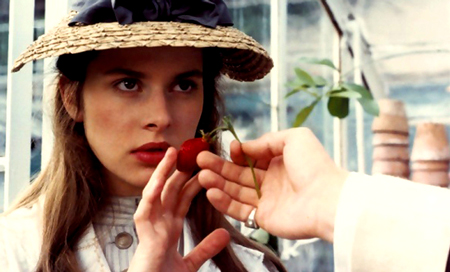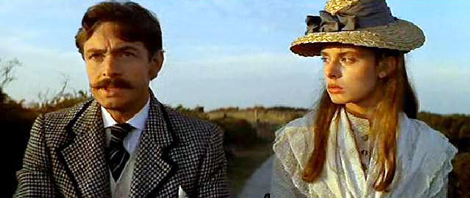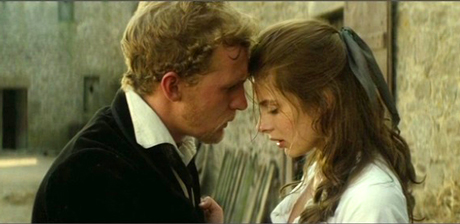|
|
Reviewed by Glenn Erickson
A modern classic that stands as an unsurpassed benchmark for literary adaptations, Roman Polanski's romantic tragedy is a departure from his previous filmography, but not a radical one. As seen here, Thomas Hardy's Tess of the d'Urbervilles is endearingly true to both her 19th century origins and Polanski's overriding themes of innocence destroyed and universal oppression. Curiously, the previous Polanski movie that Tess most closely resembles is his absurdist horror effort The Fearless Vampire Killers, another tale of woeful idealists lost in a hopelessly cruel world. Tess's richly colored English countryside (filmed in France) is a place where the wealthy prey upon the poor as if it were the natural order of things. Our virtuous heroine learns to her woe that honesty and a true heart count for almost nothing. The movie is three parts beauty to two parts pessimism.

Rural England is a beautiful place with an enormous disparity between the rich and the poor. A parson tells the penniless and foolish Mr. Durbeyfield (John Collin) that he's a descendant of the d'Urbervilles, a noble line long since fallen. His daughter Tess is quickly dispatched to the local d'Urberville mansion to ask for charity and is given a job by the dissolute Alec d'Urberville (Leigh Lawson). After he seduces her, Tess flees back home in disgrace and dismay. She later finds a happier job at a dairy farm, where she falls in love with an idealistic preacher's son, Angel Clare (Peter Firth). They make grand plans for a loving, simple life together. But Tess's determination to confide in Angel about her past causes her no end of grief.
Tess Durbeyfield is cursed by the discovery of her family's noble past. It's the last thing her ne'er-do-well father needed to know, as his newly found pride is a convenient excuse to stop being even minimally responsible to his family. Tess is expected to wheedle the cost of a new horse out of distant relatives. They turn out to actually be named Stokes, having bought the d'Urberville title years ago. The blind, dotty Mrs. d'Urberville likes to pet her barnyard chickens, and her predatory son Alec leverages every advantage of his wealth and security to possess girls like Tess. She's totally unprepared and easy prey for the maneuverings of this dishonest cad; the shot of Tess unable to resist a proffered strawberry foreshadows Alec's all-too-easy conquest. Pregnant and betrayed by both her family and the church, Tess joins the list of director Polanski's tragically isolated heroines.
Tess builds upon themes from Polanski's short films Mammals and The Fat and the Lean: the strong will always exploit the weak if they can get away with it, and the exploited will usually accept the injustice without complaint. As in The Fearless Vampire Killers, the "bad" element that wants to despoil the world for its own selfish ends is just doing what comes naturally, sucking blood or demanding rent. Tess lives in a civilized, beautiful country where a woman who ventures outside the narrow bounds of social acceptability is at great risk. The wealthy ride in coaches while ordinary milkmaids must deal with muddy roads blocking the way to church. Not going to church is unacceptable. Arriving at church in a muddy dress is unacceptable. Allowing a young man to carry you over the mud is doubly unacceptable. The rules of goodness are just another source of oppression.

Tess Durbeyfield eventually goes down to defeat, cursed by her father's pride and her own beauty. She's also victimized by gullibility, bad luck and the need for honesty and truth in her life. She divulges her past to Angel, who she mistakenly thinks is worthy of her. Bad timing ruins her second chance for happiness. More than once Tess states that she wishes that she could die, or that she had never been born.
Tess is an intimate epic showing a 19th century agricultural landscape being transformed by mechanized threshing machines. Many images are breathtakingly beautiful yet director Polanski doesn't rely on pretty pictures to make his effects. Philippe Sarde's romantic music almost seems to be mocking Tess' pain and suffering. Polanski uses uncommon restraint when it comes to scenes of a baby's death and a murder. The latter is represented only by a bloodstain on a ceiling. Thematically, the stain links up with marks and cracks in walls in Polanski's Repulsion. And don't forget Polanski's signature image of a heavy chest put to use to block a door. The "wardrobe barricade" shows up in so many of his movies that it surely bears a strong personal significance for him.
The acting is uniformly excellent, with Nastassja Kinski an alarmingly wonderful find as the embattled heroine. Sometimes she looks like a young Ingrid Bergman, but without Bergman's inner strength of self-preservation. Peter Firth is appropriately dreamy as the young idealist and Leigh Lawson memorably domineering. The rest of the accomplished cast plays an assortment of typically isolated and confused Polanski characters. Suzanna Hamilton has a special moment as another milkmaid who loves Angel from afar.
The Criterion Collection's lavish Dual Format Blu-ray + DVD of Tess recreates the absorbing theatrical experience from (in the U.S.) 1980. Newly restored by Pathé, the film is colorful, clean and darkly beautiful. Criterion's encoding was supervised and approved by Roman Polanski.

Disc producer Kate Elmore has located several lengthy documentaries. From 1979, Cine Regards (48 min.) combines a wealth of leisurely paced behind the scenes footage with interesting interview material with director Polanski. He admits to being influenced by the absurd in his movies, a view that aligns with the upheavals of his childhood and early life. The director also explains that he never uses multiple cameras, because in every scene there is only one ideal place to put the camera. Once Upon a Time, Tess (52 min.) is from 2006. Its good content provides interviews with Polanski, actors Lawson and Kinski, producer Claude Berri, costumer Anthony Powell and composer Philippe Sarde. The perspective of 25 years brings out a different set of attitudes about the movie. Ms. Kinski talks about the turmoil of her childhood and serving juvenile time as a shoplifter not long before filming began. She remembers how the discipline of the film schedule helped her find herself, under Polanski's guidance. Polanski talks about details like the cheese-making room at the dairy farm. Several of the interviewees recall a major creative crisis during post-production over the film's excessive length. Philippe Sarde in particular mourns the fact that Berri, Polanski and the creative crew did not work together again. 1 Finally, Polanski talks about identifying strongly with the 'fugitive' character in Carol Reed's Odd Man Out. Many of his main characters, including Tess, are fugitives of one kind or another.
Also present is a 51-minute South Bank TV show comprised of film clips already seen in Regards, plus a less incisive Polanski interview. And if that were not enough, the multi-part Sony documentary that accompanied the 2004 DVD release is also present. More actual production detail is covered here, along with input from writer John Brownjohn, who lived only a few feet away from the real English pub described in Hardy's novel.
All of the extra content is duplicated on both Blu-ray and DVD versions in this dual-format release. A trailer consists solely of still images from the film, most of them beautiful portraits of Nastassja Kinski. The heavily illustrated insert booklet carries an essay by critic Colin McCabe.
On a scale of Excellent, Good, Fair, and Poor,
Tess Blu-ray rates:
Movie: Excellent
Video: Excellent
Sound: Excellent
Supplements: Several documentaries and interview shows, trailer.
Deaf and Hearing-impaired Friendly?
YES; Subtitles: English
Packaging: One Blu-ray and one DVD in folding plastic and card disc holder in card sleeve.
Reviewed: February 28, 2014
Footnote:
1. from valued correspondent "B", 3.03.14"
Dear Glenn: About your sentence "Several of the interviewees recall a major creative crisis during post-production over the film's excessive length."
I'm not sure how deeply the Tess docu goes into this, but Sam O'Steen discussed his work to attempt to shorten the film in his book Cut to the Chase. By the time O'Steen (who had edited Polanski's Rosemary's Baby and Chinatown) came on to the picture, the movie was finished and already in European theatres. The film's three-hour length, combined with some initial poor reviews, had left it with no takers in the U.S. market. O'Steen went to see the film in a Paris theatre, was impressed by it, but knew his job was to somehow cut it down to a salable length. The editor recalled paring about six reels out of it. The director wasn't terribly pleased with the shortened version, but grasped the importance of gaining American distribution. Zoetrope expressed interest in releasing the movie stateside, and previewed both Polanski's long version as well as the much shorter version in Seattle. There wasn't much variance in the audience response between the two versions; it was then clear that the long version would prevail. Eventually Zoetrope dropped plans to distribute the film in America, and after a while Columbia acquired it for the U.S., planning to release it as a prestige item in late 1980 -- over a year after its European premiere. It does seem likely that Polanski incorporated at least a few of O'Steen's editorial suggestions in the U.S. print; domestically, Tess runs about 171 minutes, which is twelve or thirteen minutes shorter than its premiere length. Columbia did very carefully and shrewdly market the picture, which proved unexpectedly successful in America. Best, Always.
-- B.
Return

DVD Savant Text © Copyright 2014 Glenn Erickson
See more exclusive reviews on the Savant Main Page.
Reviews on the Savant main site have additional credits information and are often updated and annotated with reader input and graphics.
Also, don't forget the
2011 Savant Wish List.
T'was Ever Thus.
Return to Top of Page
|

